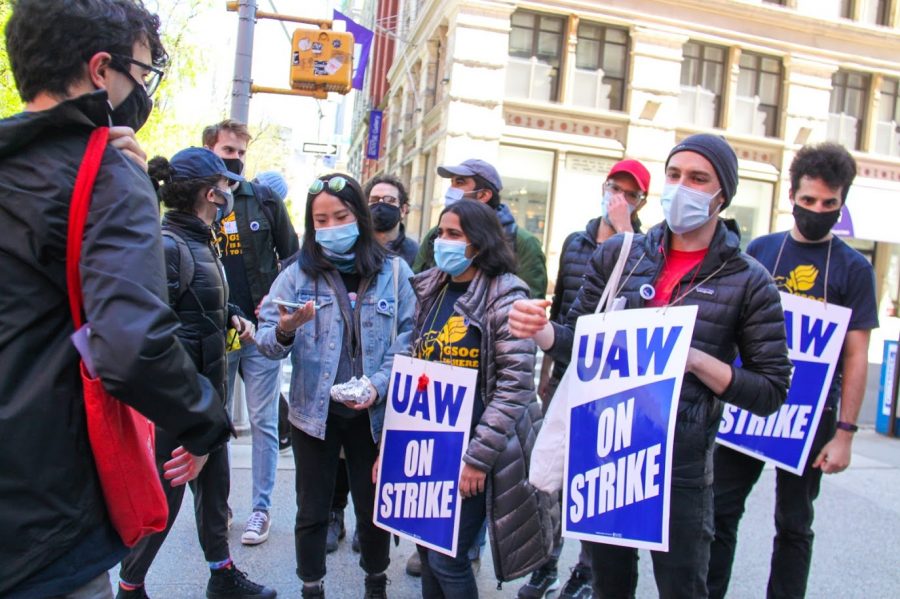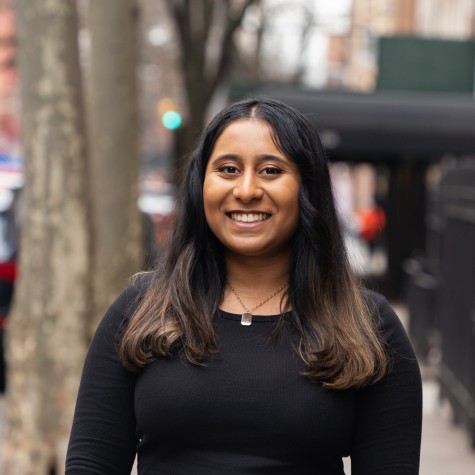Professors express solidarity with GSOC
Many NYU professors have come out in support of the Graduate Student Organizing Committee’s strike and are urging the university administration to work toward a fair and reasonable contract.
The Graduate Student Organizing Committee’s strike continues into its second week. Some NYU professors have come out in solidarity with the graduate student workers and are urging the university administration to work towards a fair and reasonable contract. (Staff Photo by Alexandra Chan)
May 3, 2021
As the Graduate Student Organizing Committee’s strike continues into its second week, some NYU professors have expressed solidarity with the graduate student workers. They issued statements in support of workers and their strike, moved classes from NYU Zoom accounts to non-NYU Zoom accounts, and urged professors to not do teaching assistants’ work or report on their union activity.
University President Andrew Hamilton and Provost Katherine Fleming explained in an April 25 email to the NYU community why they believe GSOC’s strike is unwarranted. They cited the union’s rejection of a mediator and grad student workers’ wages, which at $20 an hour are better than Harvard University grad student workers’ wages of $17 an hour. GSOC recently agreed to use a mediator under certain conditions, but their pay demands have not yet been met.
GSOC responded with a letter on April 25, noting that the cost of living is 20% higher in New York City than in Boston and that NYU hourly graduate workers’ current monthly income of $1600 is below the $2500 median rent price in New York City.
The NYU chapter of the American Association of University Professors issued a statement in support of GSOC’s strike action, asking fellow members and faculty at large to support, honor and join the picket line.
“Over the years, NYU spent tens of millions of dollars on union-busting law firms in order to prevent the establishment of a graduate employee union,” NYU-AAUP’s executive officers wrote. “We are dismayed to note that GSOC is only the latest NYU employee union that has had to authorize a strike in order to secure a contract. No union wants to ask this of their members, and it is always a last resort. Why does the NYU administration push bargaining to the brink so often?”
Lenora Hanson, a member of NYU-AAUP and an assistant professor of English at NYU, sees NYU as functioning as any corporation does, keeping labor costs low in order to invest money elsewhere.
“I think that NYU has a long history of trying to cut labor costs in order to produce as much as they can to pay upper level administrators, to pay down their debts on construction projects and real estate projects,” Hanson said. “That has a lot to do with the reasons why they don’t want to budge on compensation issues with their graduate union. So this is a struggle, at the end of the day, around NYU wanting to keep their labor costs low — which is obviously not a concern of the quality of student education, which they keep kind of referring to you as a way to negate the strike.”
Hanson believes Hamilton and Fleming’s letter undercuts the value of the education the graduate students receive at NYU, as GSOC’s demands are based on intensive research they have done around costs of living, healthcare and quality of life.
“If NYU wants to promote itself as a highly ranked and influential program with a robust and respectable graduate school, then they should trust the research that their students are doing around their own conditions of living and their own conditions of working,” Hanson said. “If our university is undercutting the research that graduate students are doing, they’re not doing a whole lot to represent the quality of education in the quality of work that the graduate students do here.”
Vasuki Nesiah, a member-at-large of NYU-AAUP’s Executive Committee and a professor of human rights and international law at Gallatin, has lived in both Cambridge, Massachusetts, where Harvard is located, and New York City. She believes the city’s different costs of living should be considered and adjusted for, not used as a comparison to keep hourly wages low.
“A living wage in New York City is radically different from a living wage in Cambridge,” Nesiah said. “I’ve lived in both cities and so I don’t think Harvard is necessarily the reference point … It needs to be the cost of living in New York City, the cost of rents in New York City. There’s a few places where it’s more difficult to live without living in precarity, and we shouldn’t ask our graduate student workers, or any workers for NYU for that matter, to live in precarity.”
Melissa Maldonado-Salcedo — a medical anthropologist and adjunct assistant professor at the Tandon School of Engineering and College of Arts and Sciences Anthropology Department, and a former graduate student at NYU — said having a family during her postgraduate meant that every moment working was also a moment away from home. She empathizes with and understands why GSOC is demanding higher wages.
“I was a grad student also at NYU, so I get how difficult it could be to try to make a dollar out of 50 cents,” Maldonado-Salcedo said. “Still, while you’re trying to pursue your professional development, sometimes it comes at the expense of your emotional and mental well-being because you’re stressed about finances or you’re stressed about trying to pay rent. So I understand why they have to take this drastic measure. That’s part of what happens when you’re in this collective bargaining space.”
Zachary Lockman, a professor in the CAS Department of Middle Eastern and Islamic Studies and the Department of History, is not surprised that Bernie Sanders and other state and local politicians support the graduate students and hopes that GSOC wins a fair contract.
“I understand NYU’s had a really difficult year dealing with COVID and its finances are constrained in various kinds of ways,” Lockman said. “There needs to be some serious give and take and some compromises that both sides feel they can live with.”
Hanson argues that because NYU brands itself as a global campus, they should be most attentive to the social justice demands regarding law enforcement and violence — such as keeping U.S. Immigration and Customs Enforcement off of campus and cutting ties with the New York City Police Department — that GSOC is bargaining for.
“These are the issues that people have been out on the streets in New York City for the past year demanding and protesting for,” Hanson said. “There’s this really strong continuity between GSOC’s demands and residents of New York City. And NYU brands itself as a campus in the city. So to that extent, if we want to think of ourselves as a university that is organically a part of the city, then GSOC’s organizing and demands [are] entirely continuous with what the residents of New York want to see, which is, defunding the NYPD, getting rid of ICE, getting rid of student debt. None of these are extreme or radical demands. They’re actually demands that people are making all over the city and all over the country.”
Meanwhile, according to Maldonado-Salcedo, faculty should not forget that grad student workers are both workers and students. While the strike is disruptive to both their studies and their work, she argues that sometimes disruption is necessary for change.
“My solidarity is always for the worker — my grandfather was a labor organizer for sugar cane cutters in Puerto Rico and my husband was a union organizer,” Maldonado-Salcedo said. “I think [the strike is] also a testament to the kind of values that NYU instilled in us in terms of our intellectual development. I met Marx in an NYU classroom, so we shouldn’t be surprised that these types of things are happening. Because this is a direct result of our critical thinking and our belief in social change.”
A version of this article appeared in the Monday, May 3, 2021, e-print edition. Email Roshni Raj at [email protected].

























































































































































